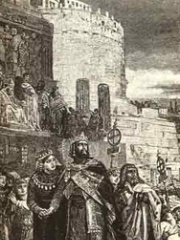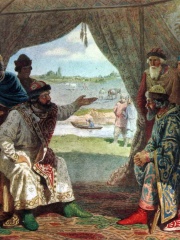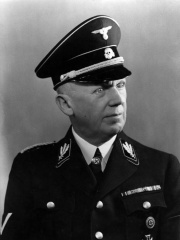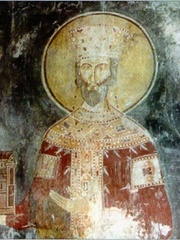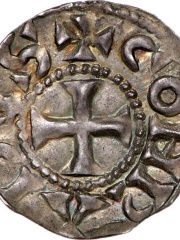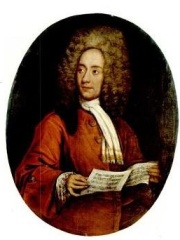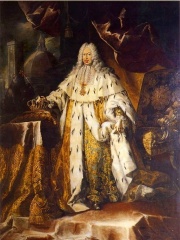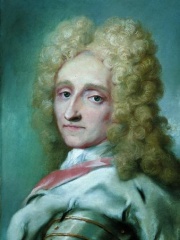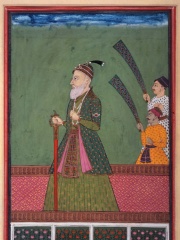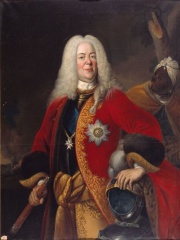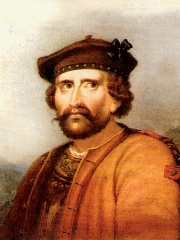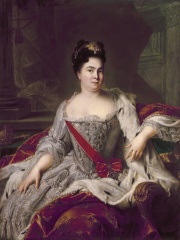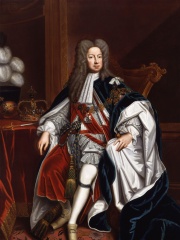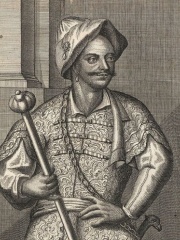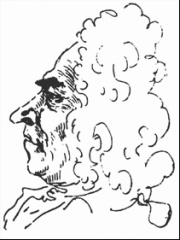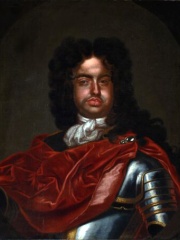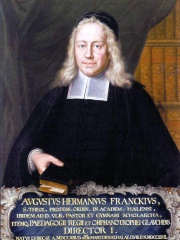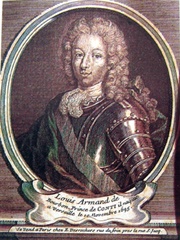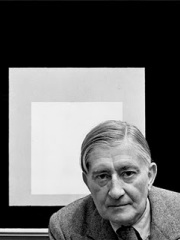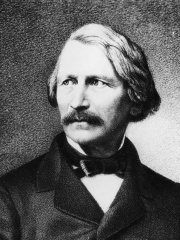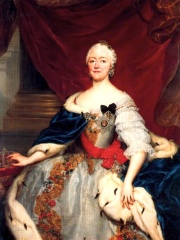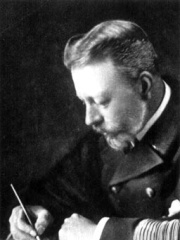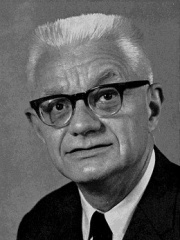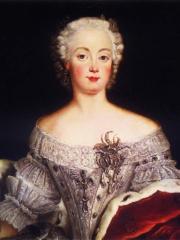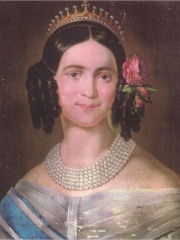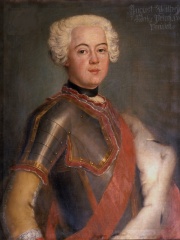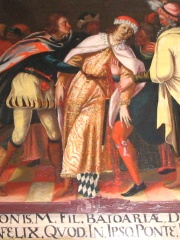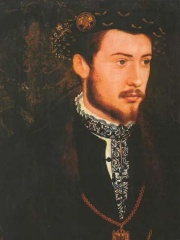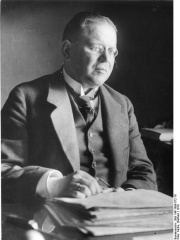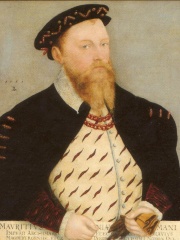POLITICIAN
Christiane Eberhardine of Brandenburg-Bayreuth
1671 - 1727
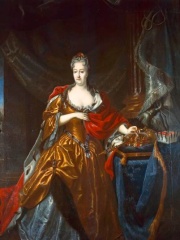
 Christiane Eberhardine of Brandenburg-Bayreuth
Christiane Eberhardine of Brandenburg-Bayreuth
Christiane Eberhardine of Brandenburg-Bayreuth (19 December 1671 – 4 September 1727) was Electress of Saxony from 1694 to 1727 (her death), Queen Consort and Grand Duchess Consort of the Polish–Lithuanian Commonwealth from 1697 to 1727 by marriage to Augustus II the Strong. Not once throughout the whole of her thirty-year queenship did she set foot in Poland-Lithuania, instead living in Saxony in self-imposed exile. Born a German margravine, she was called Sachsens Betsäule, "Saxony's pillar of prayer", by her Protestant subjects for her refusal to convert to Catholicism. Despite the allegiance of Christiane Eberhardine and her mother-in-law, Anna Sophie of Denmark, to Lutheranism, her husband and son, later Augustus III, both became Catholics, ensuring Catholic succession in the Albertine lands after a century and a half. Read more on Wikipedia
Her biography is available in 29 different languages on Wikipedia. Christiane Eberhardine of Brandenburg-Bayreuth is the 3,808th most popular politician (down from 3,095th in 2024), the 976th most popular biography from Germany (down from 830th in 2019) and the 278th most popular German Politician.
Christiane Eberhardine of Brandenburg-Bayreuth was a princess of the House of Hohenzollern and Margravine of Bayreuth by marriage. She was also a Duchess of Saxe-Weimar and Saxe-Eisenach, a Grand Duchess of Russia as consort to Grand Duke Paul, and an Electress of Brandenburg.
Memorability Metrics
Page views of Christiane Eberhardine of Brandenburg-Bayreuth by language
Among POLITICIANS
Among politicians, Christiane Eberhardine of Brandenburg-Bayreuth ranks 3,808 out of 19,576. Before her are Mursili I, Moctezuma I, Hugh of Italy, Sviatopolk II of Kiev, Carles Puigdemont, and Frederick II, Duke of Austria. After her are James II of Majorca, Hans Lammers, Al-Afdal ibn Salah ad-Din, Nguyễn Phú Trọng, Bagrat III of Georgia, and Conrad I of Burgundy.
Most Popular Politicians in Wikipedia
Go to all RankingsMursili I
1700 BC - 1590 BC
HPI: 68.28
Rank: 3,804
Moctezuma I
1398 - 1469
HPI: 68.28
Rank: 3,805
Hugh of Italy
880 - 947
HPI: 68.28
Rank: 3,806
Sviatopolk II of Kiev
1050 - 1113
HPI: 68.27
Rank: 3,807
Carles Puigdemont
1962 - Present
HPI: 68.27
Rank: 3,808
Frederick II, Duke of Austria
1211 - 1246
HPI: 68.27
Rank: 3,809
Christiane Eberhardine of Brandenburg-Bayreuth
1671 - 1727
HPI: 68.27
Rank: 3,810
James II of Majorca
1243 - 1311
HPI: 68.27
Rank: 3,811
Hans Lammers
1879 - 1962
HPI: 68.27
Rank: 3,812
Al-Afdal ibn Salah ad-Din
1170 - 1225
HPI: 68.27
Rank: 3,813
Nguyễn Phú Trọng
1944 - 2024
HPI: 68.27
Rank: 3,814
Bagrat III of Georgia
960 - 1014
HPI: 68.27
Rank: 3,815
Conrad I of Burgundy
925 - 993
HPI: 68.26
Rank: 3,816
Contemporaries
Among people born in 1671, Christiane Eberhardine of Brandenburg-Bayreuth ranks 6. Before her are Tomaso Albinoni, John Law, Gian Gastone de' Medici, Grand Duke of Tuscany, Frederick IV of Denmark, and Nizam-ul-Mulk, Asaf Jah I. After her are Frederick IV, Duke of Holstein-Gottorp, Johann Christoph Bach, Anthony Ashley-Cooper, 3rd Earl of Shaftesbury, Louis Rudolph, Duke of Brunswick-Lüneburg, Duchess Charlotte Felicitas of Brunswick-Lüneburg, and Rob Roy MacGregor. Among people deceased in 1727, Christiane Eberhardine of Brandenburg-Bayreuth ranks 4. Before her are Catherine I of Russia, George I of Great Britain, and Ismail Ibn Sharif. After her are Veronica Giuliani, Francesco Gasparini, Francesco Farnese, Duke of Parma, Aert de Gelder, August Hermann Francke, Louis Armand II, Prince of Conti, Cornelis de Bruijn, and Jakob Abbadie.
Others Born in 1671
Go to all RankingsTomaso Albinoni
COMPOSER
1671 - 1751
HPI: 79.90
Rank: 1
John Law
ECONOMIST
1671 - 1729
HPI: 75.44
Rank: 2
Gian Gastone de' Medici, Grand Duke of Tuscany
POLITICIAN
1671 - 1737
HPI: 73.28
Rank: 3
Frederick IV of Denmark
POLITICIAN
1671 - 1730
HPI: 72.67
Rank: 4
Nizam-ul-Mulk, Asaf Jah I
POLITICIAN
1671 - 1748
HPI: 70.50
Rank: 5
Christiane Eberhardine of Brandenburg-Bayreuth
POLITICIAN
1671 - 1727
HPI: 68.27
Rank: 6
Frederick IV, Duke of Holstein-Gottorp
POLITICIAN
1671 - 1702
HPI: 68.21
Rank: 7
Johann Christoph Bach
COMPOSER
1671 - 1721
HPI: 68.10
Rank: 8
Anthony Ashley-Cooper, 3rd Earl of Shaftesbury
POLITICIAN
1671 - 1713
HPI: 67.68
Rank: 9
Louis Rudolph, Duke of Brunswick-Lüneburg
NOBLEMAN
1671 - 1735
HPI: 66.53
Rank: 10
Duchess Charlotte Felicitas of Brunswick-Lüneburg
POLITICIAN
1671 - 1710
HPI: 66.15
Rank: 11
Rob Roy MacGregor
POLITICIAN
1671 - 1734
HPI: 65.68
Rank: 12
Others Deceased in 1727
Go to all RankingsCatherine I of Russia
POLITICIAN
1684 - 1727
HPI: 80.50
Rank: 1
George I of Great Britain
POLITICIAN
1660 - 1727
HPI: 78.20
Rank: 2
Ismail Ibn Sharif
POLITICIAN
1646 - 1727
HPI: 72.19
Rank: 3
Christiane Eberhardine of Brandenburg-Bayreuth
POLITICIAN
1671 - 1727
HPI: 68.27
Rank: 4
Veronica Giuliani
RELIGIOUS FIGURE
1660 - 1727
HPI: 66.60
Rank: 5
Francesco Gasparini
COMPOSER
1668 - 1727
HPI: 66.58
Rank: 6
Francesco Farnese, Duke of Parma
POLITICIAN
1678 - 1727
HPI: 65.28
Rank: 7
Aert de Gelder
PAINTER
1645 - 1727
HPI: 63.82
Rank: 8
August Hermann Francke
POLITICIAN
1663 - 1727
HPI: 62.67
Rank: 9
Louis Armand II, Prince of Conti
NOBLEMAN
1695 - 1727
HPI: 62.38
Rank: 10
Cornelis de Bruijn
WRITER
1652 - 1727
HPI: 61.67
Rank: 11
Jakob Abbadie
WRITER
1654 - 1727
HPI: 56.10
Rank: 12
In Germany
Among people born in Germany, Christiane Eberhardine of Brandenburg-Bayreuth ranks 976 out of 7,253. Before her are Josef Terboven (1898), Josef Albers (1888), Julius Schreck (1898), Gottfried Semper (1803), Duchess Maria Antonia of Bavaria (1724), and Prince Henry of Prussia (1862). After her are Carl Gustav Hempel (1905), Elisabeth Christine of Brunswick-Wolfenbüttel-Bevern (1715), Hans Scholl (1918), Christina of Saxony (1461), Agnes of Merania (1175), and Georg Wilhelm Steller (1709).
Others born in Germany
Go to all RankingsJosef Terboven
POLITICIAN
1898 - 1945
HPI: 68.31
Rank: 970
Josef Albers
ARTIST
1888 - 1976
HPI: 68.31
Rank: 971
Julius Schreck
POLITICIAN
1898 - 1936
HPI: 68.30
Rank: 972
Gottfried Semper
ARCHITECT
1803 - 1879
HPI: 68.29
Rank: 973
Duchess Maria Antonia of Bavaria
COMPOSER
1724 - 1780
HPI: 68.28
Rank: 974
Prince Henry of Prussia
POLITICIAN
1862 - 1929
HPI: 68.28
Rank: 975
Christiane Eberhardine of Brandenburg-Bayreuth
POLITICIAN
1671 - 1727
HPI: 68.27
Rank: 976
Carl Gustav Hempel
PHILOSOPHER
1905 - 1997
HPI: 68.26
Rank: 977
Elisabeth Christine of Brunswick-Wolfenbüttel-Bevern
COMPANION
1715 - 1797
HPI: 68.26
Rank: 978
Hans Scholl
SOCIAL ACTIVIST
1918 - 1943
HPI: 68.26
Rank: 979
Christina of Saxony
COMPANION
1461 - 1521
HPI: 68.25
Rank: 980
Agnes of Merania
POLITICIAN
1175 - 1201
HPI: 68.25
Rank: 981
Georg Wilhelm Steller
BIOLOGIST
1709 - 1746
HPI: 68.25
Rank: 982
Among POLITICIANS In Germany
Among politicians born in Germany, Christiane Eberhardine of Brandenburg-Bayreuth ranks 278. Before her are Princess Adelgunde of Bavaria (1823), Prince Augustus William of Prussia (1722), Louis I, Duke of Bavaria (1173), Josef Terboven (1898), Julius Schreck (1898), and Prince Henry of Prussia (1862). After her are Agnes of Merania (1175), Frederick IV, Duke of Holstein-Gottorp (1671), Albert V, Duke of Bavaria (1528), Matthias Erzberger (1875), Maurice, Elector of Saxony (1521), and Louis Ferdinand, Prince of Prussia (1907).
Princess Adelgunde of Bavaria
1823 - 1914
HPI: 68.36
Rank: 272
Prince Augustus William of Prussia
1722 - 1758
HPI: 68.31
Rank: 273
Louis I, Duke of Bavaria
1173 - 1231
HPI: 68.31
Rank: 274
Josef Terboven
1898 - 1945
HPI: 68.31
Rank: 275
Julius Schreck
1898 - 1936
HPI: 68.30
Rank: 276
Prince Henry of Prussia
1862 - 1929
HPI: 68.28
Rank: 277
Christiane Eberhardine of Brandenburg-Bayreuth
1671 - 1727
HPI: 68.27
Rank: 278
Agnes of Merania
1175 - 1201
HPI: 68.25
Rank: 279
Frederick IV, Duke of Holstein-Gottorp
1671 - 1702
HPI: 68.21
Rank: 280
Albert V, Duke of Bavaria
1528 - 1579
HPI: 68.21
Rank: 281
Matthias Erzberger
1875 - 1921
HPI: 68.19
Rank: 282
Maurice, Elector of Saxony
1521 - 1553
HPI: 68.15
Rank: 283
Louis Ferdinand, Prince of Prussia
1907 - 1994
HPI: 68.15
Rank: 284


